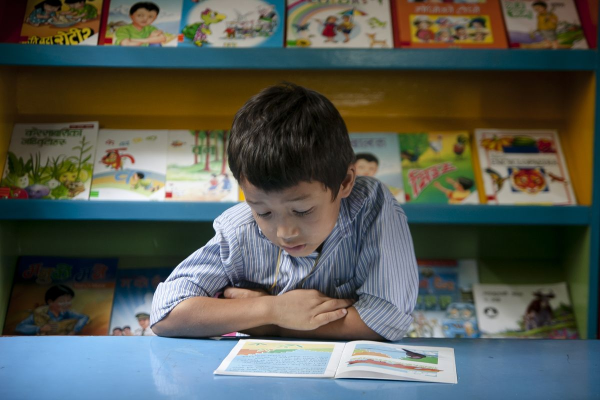As mobile devices become increasingly common, the world’s largest tech companies are focused on grabbing the next billion users by targeting developing economies.
But the excitement over the masses of potential new customers makes it easy to forget that many of those countries still suffer from low literacy rates. There are over 700 million illiterate adults in the world, or about 16% of the global population. Since 2000, Room to Read, a charity founded by former Microsoft executive John Wood, has launched educational programs in some of the world’s poorest countries. Today it announced that the Atlassian Foundation, which first partnered with Room to Read in 2009, has raised a total of $3 million for the charity with its starter license program.
Atlassian, an enterprise software company, began selling low-priced starter licenses on its products and donating all proceeds to Room to Read three years ago. When the starter program launched, Atlassian and Room to Read expected to raise $25,000. Instead, the program hit $1 million within a year.
The $3 million raised to date has allowed Room to Read to educate 170,000 children in Asia, particularly in Cambodia as the country continues to recover from the atrocities of the Khmer Rouge regime.
Wood says he wants to make sure the momentum continues. Room to Read’s goal is to reach 250,000 kids by the end of this year by raising at least another $750,000 through Atlassian. The company is also helping Room to Read raise additional funds by auctioning a custom emoticon that all HipChat users will see.
Atlassian’s support has enabled Room to Read to establish 238 libraries, build or renovate 13 schools, and publish 13 local language children’s books in Cambodia. It has also provided scholarships for 1,480 girls there to complete secondary school. Room to Read’s alumni have gone on to pursue careers in rural development, teaching, accounting, and healthcare.
Breaking the cycle of poverty
The founders of Atlassian, Mike Cannon-Brookes and Scott Farquhar, decided to get involved with Room to Read after reading Wood’s book “Leaving Microsoft To Change The World.”
Atlassian was founded with a “1% model,” which means that 1% of its profits and equity are donated to charity, says Melissa Beaumont Lee, head of the company’s foundation. Employees are also given five days of paid leave each year to volunteer for non-profits. Other charities the company supports include Social Ventures Australia and San Francisco-based non-profits San Francisco Education Fund, Students Rising Above, Reading Partners, and Gray Area Foundation for the Arts.
One of the reasons Atlassian picked Room to Read is because Cannon-Brookes and Farquhar believe that education is key to breaking the cycle of poverty in developing countries.
“While there is a tremendous number of inspiring and worthwhile organizations to fund, we believe that the solution to many problems is to find more people to work on those problems, and that starts with getting more people educated,” says Beaumont Lee.
Before launching Room to Read as Books for Nepal in 2000, Wood spent eight years overseeing Microsoft’s marketing and business development teams throughout Asia. While traveling for work, he was struck by the disparity between different countries on the continent.
“I would go from a meeting in a beautiful conference room the 50th floor of a skyscraper in Hong Kong to Cambodia, where the education system had not been rebuilt after the Khmer Rouge,” says Wood. He realized countries with the strongest education infrastructure also enjoyed the most economic growth.
“It’s a Catch-22. A headmaster in Nepal told me ‘we are too poor to afford education, but unless we get education, we will stay poor,’ Wood adds. “So I quit Microsoft because it seemed unfair that these kids have basically lost the lottery of life.”
Wood emphasizes that it is very inexpensive to educate children in developing countries. For example, $5,000 is enough to build a library. A year-long scholarship for one child is just $250 in places like Cambodia, Laos, and Vietnam.
“It’s a hand-up, not a hand-out,” says Wood.
One of the reasons Room to Read focuses on Cambodia is because the Khmer Rouge, which killed an estimated 1.3 million people, targeted educated people and burned down schools in order to eliminate threats to the regime’s power. Now the Cambodian government wants to rebuild civil society by focusing on restoring the country’s educational system.
In addition to opening libraries and schools and funding long-term scholarships, Room to Read also sponsors teacher training in literacy programs in Cambodia because the Khmer alphabet is especially complicated.
Helping educate girls
Resources built by Room to Read are open to all children, but the program focuses on helping girls because two-thirds of the 880 million illiterate adults in the world are women. The social benefits of educating girls in developing countries include stronger per capita income growth and decreased infant mortality rates.
“The cost to give a girl everything she needs for school, from a uniform to life skill coaching is only $250 per year,” says Wood. “It’s an insanely small amount of money that changes the girl forever, and yet over 100 million girls woke up this morning and didn’t go to school. An education is no doubt the single best way to get families and whole societies out of poverty and it’s not that expensive.”
Wood says he wants to find 10 to 20 more corporate sponsors with Room to Read and encourages interest companies to email him directly at john.wood@roomtoread.org. Individual donors can find more information here. The organization aims to educate 10 million children by the end of 2015.
The tech industry also benefits as the global illiteracy rate drops, he adds.
“I think it’s a humanitarian issue and an issue that the tech community should care about because most tech is useless to a person who can’t read or write,” says Wood. “We’re limiting sides of the market if we allow 780 million people to remain illiterate.”
